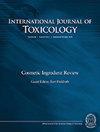In Utero Exposure to Di-n-butyl Phthalate Causes Modulation in Neurotransmitter System of Wistar Rats: A Multigenerational Assessment.
IF 1
4区 医学
Q4 PHARMACOLOGY & PHARMACY
引用次数: 0
Abstract
Neuroendocrine regulation is disrupted by di-n-butyl phthalate (DBP) when exposure occurs during the critical periods of fetal development, which can lead to neurological disorders. To evaluate the toxic potential of DBP, it is necessary to conduct teratological studies, which could determine impacts on the development of the fetus. The present study was designed to understand the sequelae of neuroendocrine regulation in one-month-old pups when rats were exposed to DBP (F1-F3) in utero and during lactation. The rats received DBP (500 mg/kg BW/day) dissolved in olive oil through oral gavage from gestation day 6 to postnatal day 30, while the control group received the olive oil (vehicle) during the same timeline. Following the exposure, thyroid profile and estradiol, which were measured at GD-19, exhibited a significant decrease (P < 0.05) in dams (F0-F2). The exposure resulted in developmental outcomes, including underdeveloped fetuses, and a notable number of resorptions in experimental rats. The one-month-old pups were assessed for serum thyroid profile and testosterone and neurotransmitters in discrete brain regions, cerebral cortex, cerebellum, and hippocampus for up to three generations. The levels of dopamine and cortisol showed a significant increase (P < 0.05), but serotonin levels decreased when examined in distinct brain regions of the experimental group as compared to the control. DBP, which is considered an endocrine disruptor, had the most impact on the third generation in this study, leading to a significant decrease in testosterone levels. In summary, in utero exposure to DBP impaired the neuroendocrine system and had an antiandrogenic effect in the three successive generations.子宫内暴露于邻苯二甲酸二正丁酯对 Wistar 大鼠神经递质系统的影响:多代评估。
在胎儿发育的关键时期接触邻苯二甲酸二丁酯(DBP),会破坏神经内分泌调节,从而导致神经系统紊乱。为了评估 DBP 的毒性潜力,有必要进行畸形研究,以确定其对胎儿发育的影响。本研究旨在了解大鼠在子宫内和哺乳期暴露于 DBP(F1-F3)对一个月大幼鼠神经内分泌调节的后遗症。从妊娠第 6 天到出生后第 30 天,大鼠通过口服灌胃接受溶解在橄榄油中的 DBP(500 毫克/千克体重/天),而对照组则在相同的时间段内接受橄榄油(载体)。暴露后,在 GD-19 测得的甲状腺概况和雌二醇在母鼠(F0-F2)中显示出显著下降(P < 0.05)。接触导致了实验鼠的发育结果,包括胎儿发育不全和明显的胎死腹中。对一个月大的幼鼠进行了血清甲状腺概况、睾酮和离散脑区、大脑皮层、小脑和海马神经递质的评估,最多达三代。与对照组相比,实验组不同脑区的多巴胺和皮质醇水平显著上升(P < 0.05),但血清素水平下降。DBP 被认为是一种内分泌干扰物,在本研究中对第三代的影响最大,导致睾酮水平显著下降。总之,子宫内暴露于 DBP 会损害神经内分泌系统,并对连续三代人产生抗雄激素作用。
本文章由计算机程序翻译,如有差异,请以英文原文为准。
求助全文
约1分钟内获得全文
求助全文
来源期刊
CiteScore
3.40
自引率
4.50%
发文量
53
审稿时长
4.5 months
期刊介绍:
The International Journal of Toxicology publishes timely, peer-reviewed papers on current topics important to toxicologists. Six bi-monthly issues cover a wide range of topics, including contemporary issues in toxicology, safety assessments, novel approaches to toxicological testing, mechanisms of toxicity, biomarkers, and risk assessment. The Journal also publishes invited reviews on contemporary topics, and features articles based on symposia. In addition, supplemental issues are routinely published on various special topics, including three supplements devoted to contributions from the Cosmetic Review Expert Panel.

 求助内容:
求助内容: 应助结果提醒方式:
应助结果提醒方式:


